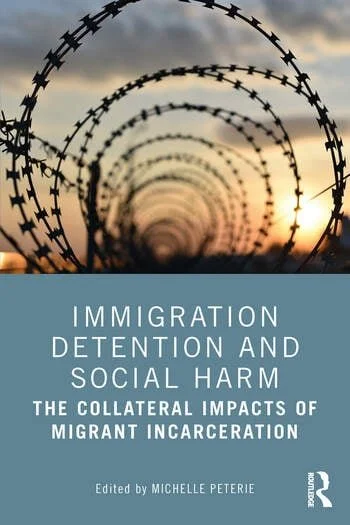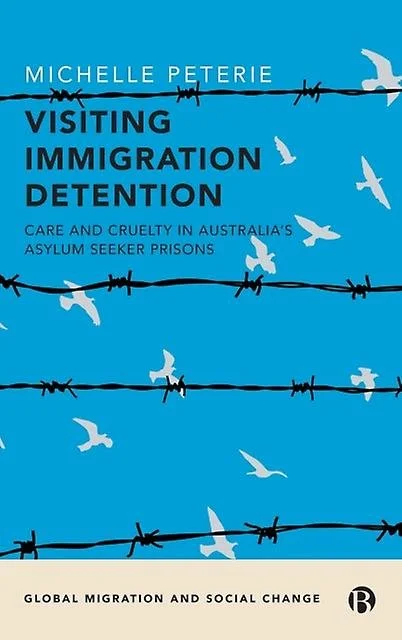CURRENT STUDIES
Michelle is currently leading two Australian Research Council (ARC) projects about immigration detention in Australia. Both studies are being undertaken in partnership with the Australian Human Rights Commission.
Child Wellbeing in the Context of Parental Detention: The first project is an ARC DECRA study about children’s experiences of parental immigration detention and/or deportation. As part of this study, the team will be speaking with children who have had a parent detained in or deported from Australia. They will also be speaking with these children’s parents/guardians, and with the people who support them. Interviews are being conducted face-to-face in Australia and Aotearoa New Zealand between July 2023 and June 2024.
The Forgotten Children, Ten Years On: The second project is an ARC Linkage study about the long-term impacts of immigration detention in the lives of people who were detained as children. The research builds on the AHRC’s 2014 Forgotten Children report, and will be one of the first studies internationally to investigate the long-term impacts of detaining children. The team is interested in speaking to people who were detained in Australia’s onshore or offshore detention system at any point during their childhoods. Recruitment for this project will commence in mid-2024, with interviews to be conducted between September 2024 and December 2025.
For more information about either of these studies, or to get involved, please contact Michelle.
COMING SOON
Immigration Detention and Social Harm: The Collateral Impacts of Migrant Incarceration (Available to Pre-Order)
This interdisciplinary edited collection is the first internationally to comprehensively explore the harms immigration detention imposes beyond the detainee. Bringing together research from North America, the UK, Europe and Australia, it shows how the harms detention imposes ramify beyond singular bodies, moments and locations – reverberating through families and communities and echoing across time.
The book is structured in three parts. Part One: Human Costs, examines the harms immigration detention imposes on people who are not personally incarcerated, but whose lives are nonetheless entangled with detention regimes. Part Two: Societal Consequences highlights the corrosive impacts of immigration detention at the societal level, including the role migrant incarceration plays in naturalising and perpetuating inequalities and injustices. Part Three: Ending the Harm interrogates the possibilities of detention reform and detention abolition.
This book will be a key reference text for scholars and students in the social and behavioural sciences who are interested in immigration detention, human rights and/or incarceration.
PREVIOUS STUDIES
Visiting Immigration Detention (Hardback, Paperback or EBook Available)
Visiting Immigration Detention offers a fresh angle on the human costs of immigration detention.
Drawing on over 70 interviews with regular visitors to Australia’s onshore immigration detention facilities, Peterie paints a unique and vivid picture of these carceral spaces. The book contrasts the care and friendship exchanged between detainees and visitors with the isolation and despair that is generated and weaponised through institutional life. It shows how visitors become targets of institutional control, and theorises the harm detention imposes beyond the detainee.
As the first research in this area, this book bears important witness to Australia’s onshore immigration detention system, and offers internationally relevant insights on immigration, deterrence and the politics of solidarity.
LEARN MORE
“The current debate about immigration detention [...] obscures the profound humanitarian implications of the High Court’s ruling. It also ignores the urgent need for further reform to ensure innocent people (including children) are not unduly punished. And it rationalises ongoing incarceration - beyond the terms of a criminal sentence - as a valid response to non-citizens who have already served their time.”
“Carceral institutions are not only places of oppression and domination but also sites of negotiation, compromise, and resistance. Everyday practices like eating are part of this picture. Institutional power extends to and manifests in the food that prisoners eat. Equally, meals can be a locus of everyday resistance, where prisoners assert autonomy and symbolically circumvent the institution’s control over their bodies. ”
“Between July 2018 and August 2019, the Home Affairs Department spent A$6.1m flying refugees, asylum seekers and other immigration detainees around Australia. Yet deeper questions about what these relocations involve and how they affect detainees and their supporters have been largely ignored. ”
“Some people in immigration detention could be asked to pay for their own incarceration, as part of a new border protection policy announced by the Coalition [...] Whatever political thinking underlies the major parties’ positions, charging detainees for their incarceration is a bad move. ”
“Mobile phones are a lifeline for those in immigration detention. But if the government has its way, this thread will soon be cut. [...] Banning mobile phones would rob detainees of many of the strategies they use to survive and access justice. It would also punish detainees’ children, partners, parents and friends.”
SELECTED ACADEMIC PUBLICATIONS
Free copies available. Please contact Michelle.
Food, Care, and Carceral Power: The Politics of Commensality in Australian Immigration Detention
PETERIE, Michelle (2022) Journal of Refugee Studies
Carceral institutions are not only places of oppression and domination but also sites of negotiation, compromise, and resistance. Everyday practices like eating are part of this picture. Institutional power extends to and manifests in the food that prisoners eat. Equally, meals can be a locus of everyday resistance, where prisoners assert autonomy and symbolically circumvent the institution’s control over their bodies. Drawing on more than 70 interviews with visitors to Australian immigration detention facilities, this article adds to this discussion of prison fare by exploring how visitor–detainee commensality shapes institutional dynamics of power and resistance. It shows that visitor–detainee meals have the potential to disrupt the carceral machine by affording detainees access to psychological nourishment and escape. Equally, it argues that the realization of this potential depends on detainees and their visitors building relationships that challenge, rather than reproduce, orthodox hierarchies between ‘hosts’ and ‘guests’, caregivers and care receivers.
Forced Relocations: The Punitive Use of Mobility in Australia’s Immigration-detention Network
PETERIE, Michelle (2021) Journal of Refugee Studies
In the interdisciplinary scholarship regarding immigration detention, the social, political and psychological costs of confinement are well documented. In recent years, however, scholars have also drawn attention to coerced forms of movement in some detention systems. Drawing on thirty in-depth, semi-structured interviews with volunteer visitors to Australia’s immigration-detention facilities, this article makes two main contributions to this scholarship. First, it presents empirical evidence regarding the use of forced mobility in Australia’s detention system. Dialoguing with work from other countries, it shows how these practices impact detainees and their supporters in the Australian context. Second, it builds upon and extends existing theoretical insights regarding the purposes of such mobility. While previous studies have concluded that relocations serve to isolate, punish and disorient prisoners, this article takes this argument a step further, positing that coerced mobility is also employed to encourage so-called ‘voluntary’ repatriations, thus serving overarching political objectives.
PETERIE, Michelle (2018) Refugee Survey Quarterly
The relationship between immigration detention and trauma is well established, and scholars have often employed Agamben’s notion of the camp to explain the psychological deterioration that asylum-seekers experience in detention. Using Australia as a case study, this article argues that while the camp model is highly instructive in some contexts (such as Australia’s offshore processing facilities), it is less useful in understanding facilities that are ostensibly bound by social and legal constraints (such as Australia’s onshore detention facilities). Detention centres such as those on the Australian mainland, this article demonstrates, are best understood not as camps but as prisons. In making this claim, this article opens up a rich body of empirical and theoretical research regarding the operation of power – and, in particular, the infliction of psychological pain – in carceral institutions. In doing so, it provides a theoretical scaffolding for understanding how immigration detention facilities can and do inflict harm in situations where governments must maintain an appearance of civility and respect for the law. Furthermore, it provides a grounding and vocabulary for understanding outcomes such as trauma and mental illness not as failures of immigration detention systems, but as some of their core functions.
NEIL, David and Michelle PETERIE (2018) Asia Pacific Viewpoint
The notion of dark networks has recently received attention in the literature on policy network analysis. Dark networks are defined as illegal and covert, in contrast to bright networks which are legal and overt. In this article, we suggest a third category – grey networks – which are characterised by their use of secrecy and concealment despite their ostensibly legal status. These networks are subject to contradictory imperatives. They employ methods that cannot be openly acknowledged within the larger legal and social framework in which they function. In this article, we illustrate this concept through an interview‐based study of Australia's immigration detention network. This network enacts a deterrence policy which has been widely condemned as breaching Australia's obligations under international law. At the same time, it is required to maintain a façade of lawfulness and respect for human rights.
PETERIE, Michelle (2018) Journal of Sociology
This article documents the experiences of volunteer visitors to Australia’s onshore immigration detention facilities, and considers what they reveal about the operation of power within this detention network. While immigration detention systems (including Australia’s) have received considerable academic attention in recent years, few scholars have examined the experiences of volunteers. Further, while the existing scholarship points to the negative impacts of immigration detention on detainees, the question of how these outcomes are produced at the level of daily institutional life has gone largely unanswered. The testimonies presented here provide a valuable window onto daily life in Australia’s onshore immigration detention centres, highlighting the opaque and capricious mechanisms through which they produce emotional distress in both asylum seekers and their supporters. In documenting these mechanisms and their effects, this article shows how ‘deterrence’ is enacted through the small and seemingly innocuous details of institutional life.
PETERIE, Michelle (2019) Emotions in Late Modernity
As a motivation for social justice-oriented action, compassion has been criticised for presupposing an unequal power relationship between a privileged giver of compassion and a disadvantaged subject. Critics argue that ‘compassionate’ relationships reinforce and reproduce inequalities; they also imply that care givers derive emotional gratification from their privileged roles. In making these arguments, scholars in this tradition charge volunteers with a failure of reflexivity. This chapter interrogates these ideas through an empirical study of volunteer reflexivity in asylum seeker friendship programmes. It draws on in-depth interviews with 30 volunteers who support asylum seekers in Australia’s onshore immigration detention facilities, and foregrounds the role of reflexivity in this work. This chapter provides evidence (a) that reflexively managed moral emotions concerning Australia’s ‘politics of fear’ inspire volunteers to begin visiting detention; (b) that reflexively managed guilt regarding the structural injustices that they encounter in detention inform their volunteer relationships; and (c) that mutual exercises in emotion work – where asylum seekers and volunteers work together to create small pockets of normality – are common in these affective institutional settings. In presenting these findings, this chapter contests the previously described understanding of care-based volunteer work. It also provides evidence of the role of reflexivity in late modernity.
A full list of Michelle’s publications - including other articles concerning people seeking asylum - is available HERE.








